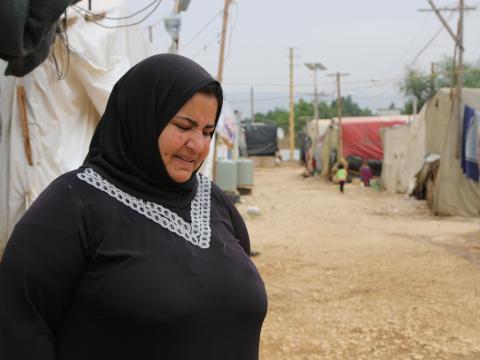Imagine all the thirsty children!

In July 2017, I met a Syrian refugee woman named Sourayya, who spoke of how women like her were starting to find solutions for keeping their families alive and healthy in an informal tented settlement in Lebanon’s Bekaa Valley. Back then, Sourayya was upbeat as she emphasized how the water assistance, provided by World Vision with funds from UNICEF, improved her life and her children. But when we met again in May, Sourayya was downcast as she talked about the water supply reduction for 230 Syrian refugees, including 122 children, in the settlement she resides in. Not only was this move affecting one settlement, but also refugees all across the Bekaa Valley.
Funding cuts that began last February have led to the reduction in the water, sanitation and hygiene (WASH) services. Each household used to receive 35 liters of water per individual once every week (four times a month) which adds up to almost 1000L per week used for washing clothes, hygiene purposes, cooking and other function. Over the past several months, that figure and been cut in half and women like Sourayya say they’re worried about their ability to deal with reduced water supplies. “It’s a crisis. We’re alive but we’re not living. The least we can say is that we are coping,” she said.
The summer heat will start soon and life in the Bekaa Valley, hard as it is, will likely get even more difficult. July and August are normally the warmest months of the year in Lebanon. With their deteriorating financial situation, refugees can hardly spare any additional money to purchase water. “If I have a couple of dollars left, I buy water bottles. If not, I go around asking people from this town for potable water. They are usually helpful, but do you think in July or August people would let go of their share of water?” Sourayya asked. “We are a burden on the Lebanese people. The water resources are not enough for them. It is not fair for us to ask them to think of our children before theirs!”
Sourayya believes that this problem will cause even more friction between the Syrian refugees within the same settlement, especially if one family is able to buy water while their neighbor’s aren’t. “People will definitely fight over water,” Sourayya assured. Refugees who live below poverty line have to pay $800 (USD) to ren one tent per year as well as $40 (USD) for electricity monthly. There are few, if any, who can spare money for water. “Imagine all the thirsty children!” she exclaims.
The burden of this reduction falls most heavily on the children in the settlements in the Bekaa Valley. They won’t have their daily showers, and they won’t be able to wash their hands as often as needed. “We already have a massive issue with hygiene in the camps. People are prioritizing the purchase of water for cooking rather than hygienic purposes,” said Sourayya, “For example, the tents are not being cleaned. Children are surrounded with dirt all the time.” She mentioned that their community never thought the water assistance would ever be reduced, but now the thought of not receiving this assistance at all is somehow haunting them. “If the assistance ever stops, it will be a catastrophe! I cannot begin to think of all these children falling ill, and these women going through miscarriages, and the elderly having to beg for water!” Sourayya wipes away her tears and adds “we hope we could go home one day and not dwell on this!”
Lynn Bou Saba, water, sanitation and hygiene (WASH) project manager at World Vision Lebanon, says that the water reduction has created a burden on both beneficiaries and World Vision staff. “Beneficiaries are forced to buy additional quantities of water in order to fulfil their need which is increasing their financial burden,” adding that most refugees are already in debt. “Other beneficiaries who cannot afford to buy water are turning to alternative water sources that are mostly contaminated such as boreholes and rivers, which creates health risk for them and especially among infants,” Lynn continued. The World Vision staff is often confronted by beneficiaries complaining about the water reduction, expressing that water is a priority for them and requesting additional quantities of water especially during summer months. Lynn emphasizes that this water shortage is a nationwide issue, and it has also affected the delivery and effectiveness of other activities, such as the hygiene promotion sessions, especially when it comes to personal hygiene topics. “Beneficiaries would express the irrelevance of the sessions since they barely have water to practice the personal hygiene guidelines. Concerns are mainly directed towards the decrease in funding leading to the reduction in the delivery of water and sanitation services,” said Lynn, “In my opinion; these services are strongly related to the beneficiaries’ good health and preserving a healthy environment that’s free from wastewater.”
In 2017, Sourayya was grateful for the life-saving water service that protected her children. A year later, she asks a life or death question: What if the water services stop?” Sourayya, like many other refugees, is worried about her family’s well-being and the well-being of others. They are aware that a long-term solution is needed, because water is life.